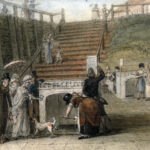12 October 0633: Edwin of Northumbria is killed and his army defeated by Gwynedd and Mercia at Hatfield Chase near Doncaster
Bede. 1998. Ecclesiastical History of the English Nation. Book II. Fordham University, New York: Internet Medieval Source Book. Get it:
.Unedited excerpt
If an excerpt is used in the book, it will be shorter, edited and, where applicable, translated.
Edwin reigned most gloriously seventeen years over the nations of the English and the Britons, six whereof, as has been said, he also was a servant in the kingdom of Christ. Cadwalla; king of the Britons, rebelled against him, being supported by Penda, a most warlike man of the royal race of the Mercians, and who from that time governed that nation twenty-two years with various success. A great battle being fought in the plain that is called Heathfield, Edwin was killed on the 12th of October, in the year of our Lord 633, being then forty-seven years of age, and all his army was either slain or dispersed. In the same war also, before him, fell Osfrid, one of his sons, a warlike youth; Eanfrid, another of them, compelled by necessity, went over to King Penda, and was by him afterwards, in the reign of Oswald, slain, contrary to his oath. At this time a great slaughter was made in the church or nation of the Northumbrians; and the more so because one of the commanders, by whom it was made, was a pagan, and the other a barbarian, more cruel than a pagan; for Penda, with all the nation of the Mercians, was an idolater, and a stranger to the name of Christ; but Cadwalla, though he bore the name and professed himself a Christian, was so barbarous in his disposition and behaviour, that he neither spared the female sex, nor the innocent age of children, but with savage cruelty put them to tormenting deaths, ravaging all their country for a long time, and resolving to cut off all the race of the English within the borders of Britain. Nor did he pay any respect to the Christian religion which had newly taken root among them; it being to this day the custom of the Britons not to pay any respect to the faith and religion of the English, nor to correspond with them any more than with pagans. King Edwin’s head was brought to York, and afterwards into the church of St. Peter the Apostle, which he had begun, but which his successor Oswald finished, as has been said before. It was deposited in the porch of St. Gregory, Pope, from whose disciples he had received the word of life.
Comment
Comment
Bede gives the date as 12 October, but the Anglo-Saxon Chronicle says 14 October. Bede also gives the year as 633, but uncertainty about when Bede considered a year to begin means the battle may have actually taken place in 632 (Wikipedia contributors 2021).
A quite absurd take on the battle is to be found in “Dirge of Offa” (Ball 1772). Ball was chaplain to the Countess Dowager of Barrymore, and attributed his doggerel to “Mordrid, chief of the bards”, beginning thus:
See my son, my Offa, dies!
He who could chase his father’s foes!
Where shall the king now close his eyes?
Where – but in the tomb of woes.‘Tis there, thy stony couch is laid!
And there the wearied king may rest —
But will not Penda’s threats invade
The quiet of the monarch’s breast?
Something to say? Get in touch
Similar
 12 April 0627: In a triumph for his Kentish wife, Edwin of Northumbria is baptised on Easter Sunday by Paulinus, in the latter’s wooden oratory on the site of York Minster
12 April 0627: In a triumph for his Kentish wife, Edwin of Northumbria is baptised on Easter Sunday by Paulinus, in the latter’s wooden oratory on the site of York Minster 25 September 1066: The Stamford Bridge massacre by Harold Godwinson’s army of Harald Hardrada and Tostig Godwinson’s force – symbol of the end of the Viking Age
25 September 1066: The Stamford Bridge massacre by Harold Godwinson’s army of Harald Hardrada and Tostig Godwinson’s force – symbol of the end of the Viking Age 23 March 0867: Viking mercenaries draw the Anglo-Saxons of Ælla of Northumbria into the streets of York and slaughter them
23 March 0867: Viking mercenaries draw the Anglo-Saxons of Ælla of Northumbria into the streets of York and slaughter them 8 June 0793: Alcuin of York, a leading light of the Carolingian Renaissance, reflects in a poem on the devastation this day of Lindisfarne by Vikings
8 June 0793: Alcuin of York, a leading light of the Carolingian Renaissance, reflects in a poem on the devastation this day of Lindisfarne by Vikings 24 February 1777: Penniless bohemian Tom Fashion calls on redneck Yorkshire moneybags Sir Tunbelly Clumsy during tonight’s London première of a Sheridan play
24 February 1777: Penniless bohemian Tom Fashion calls on redneck Yorkshire moneybags Sir Tunbelly Clumsy during tonight’s London première of a Sheridan play
Comment
Comment
I only know about banking up potatoes, so the story of the trees is very interesting.
Something to say? Get in touch
Search
Donate
Music & books
Place-People-Play: Childcare (and the Kazookestra) on the Headingley/Weetwood borders next to Meanwood Park.
Music from and about Yorkshire by Leeds's Singing Organ-Grinder.


 Bluesky
Bluesky Extwitter
Extwitter